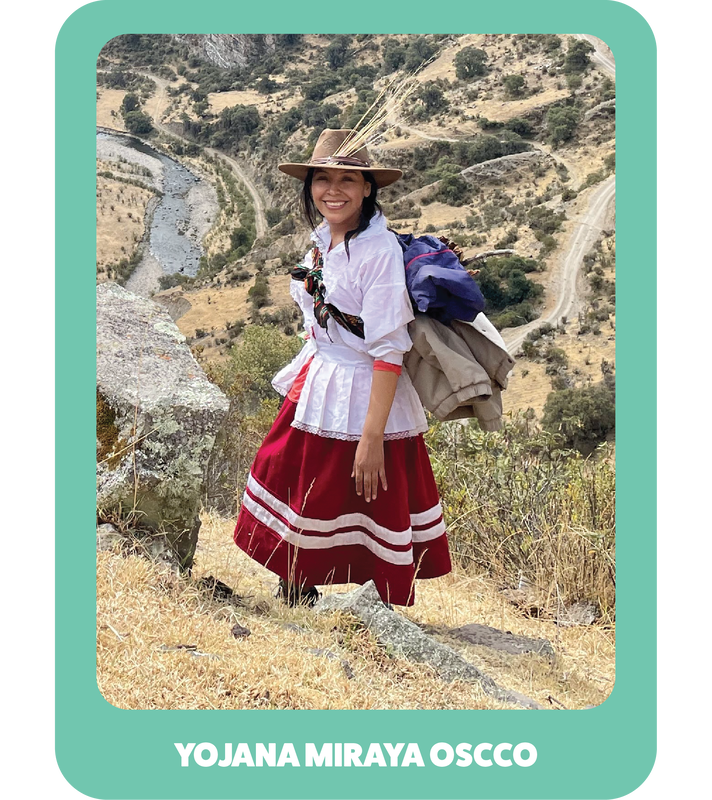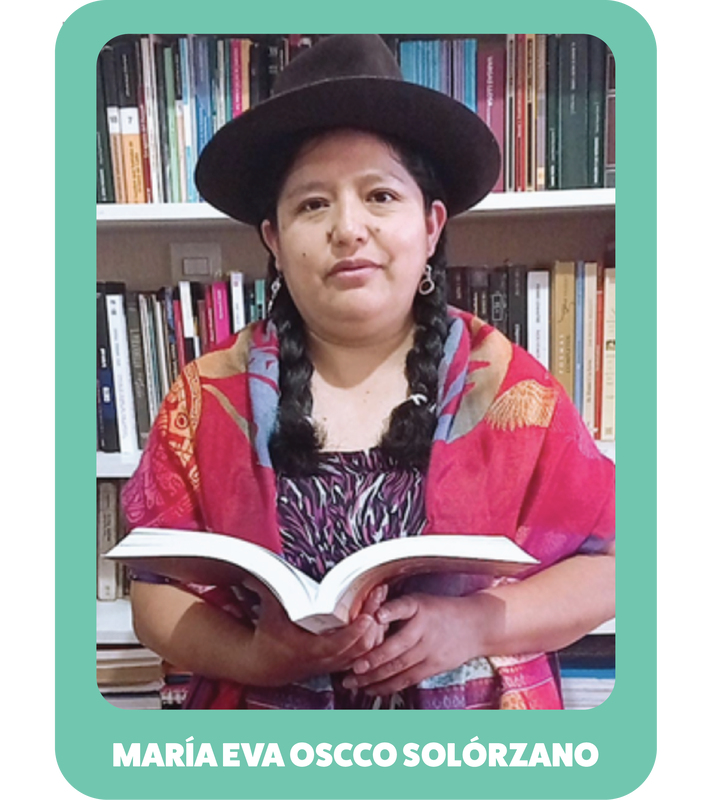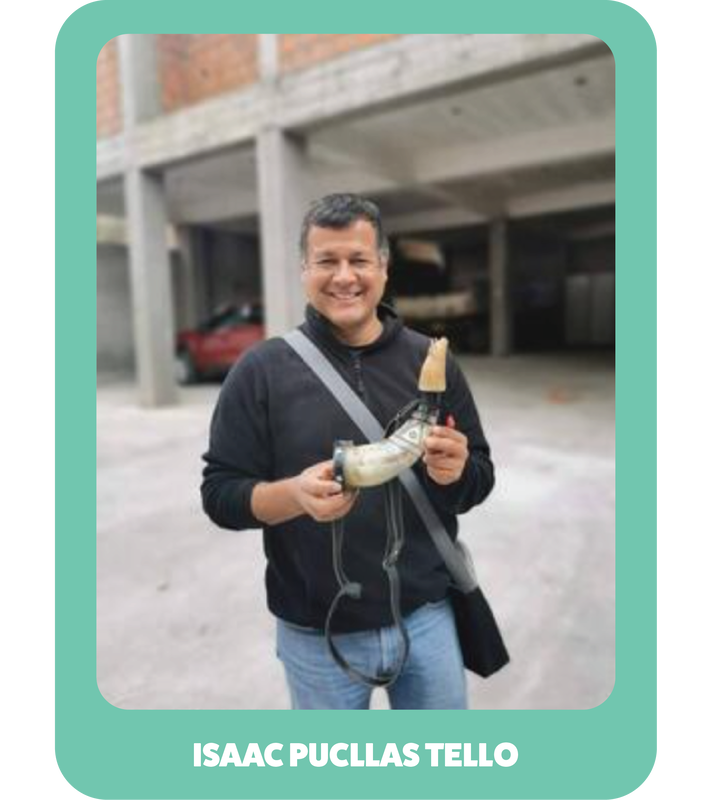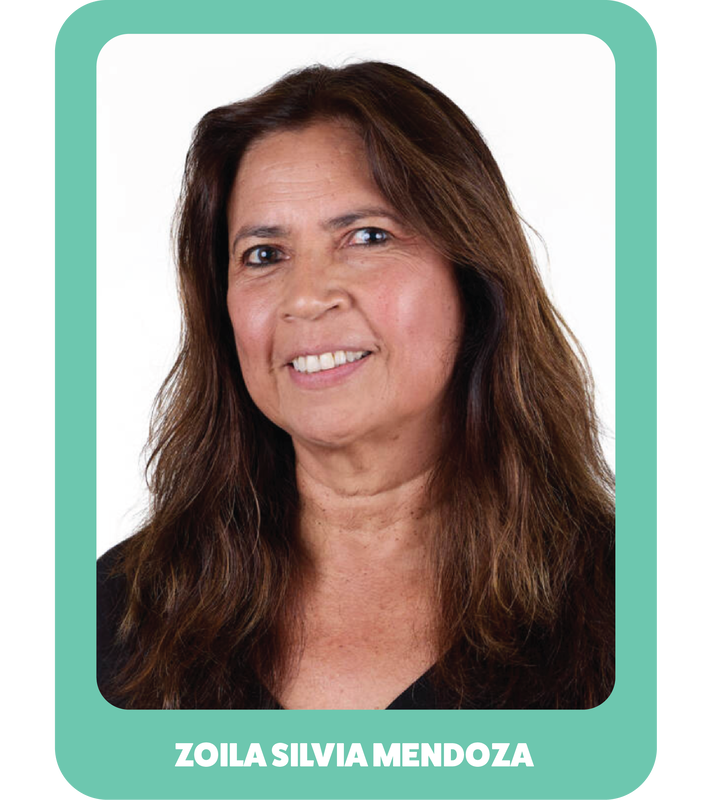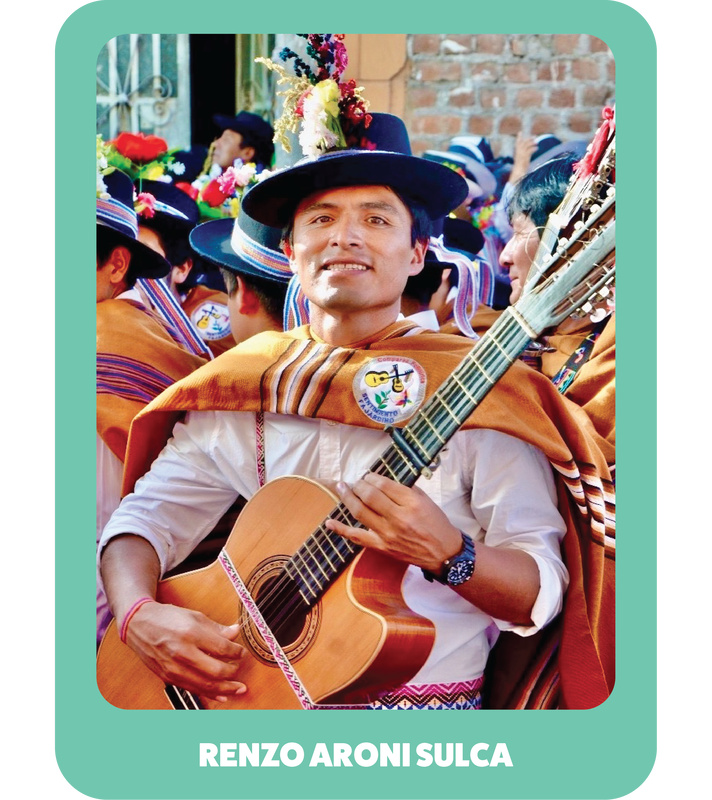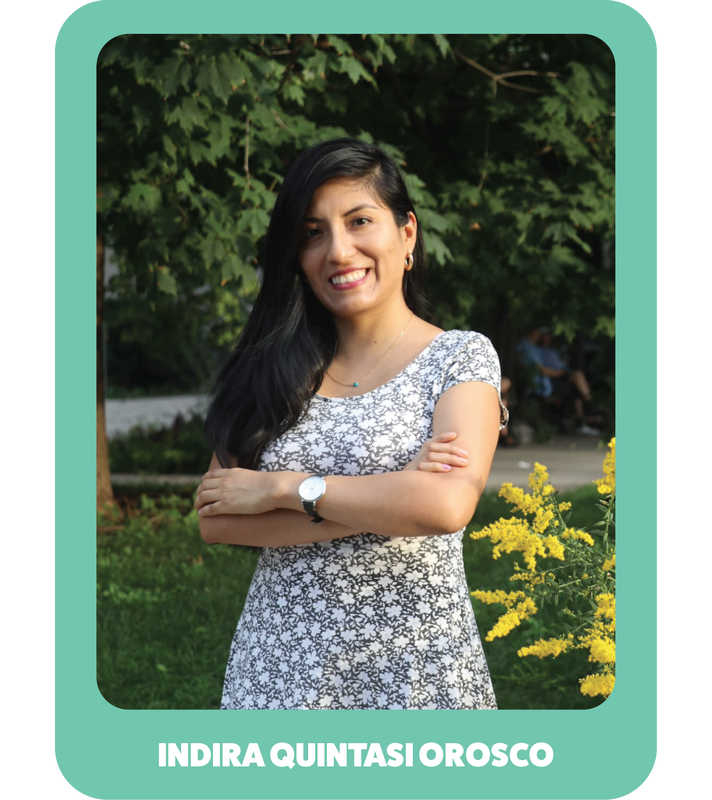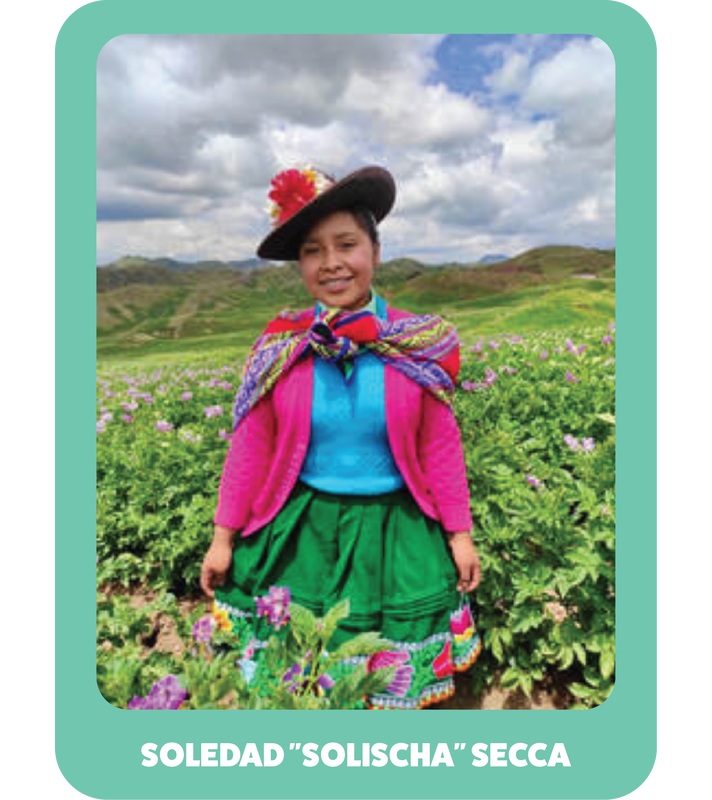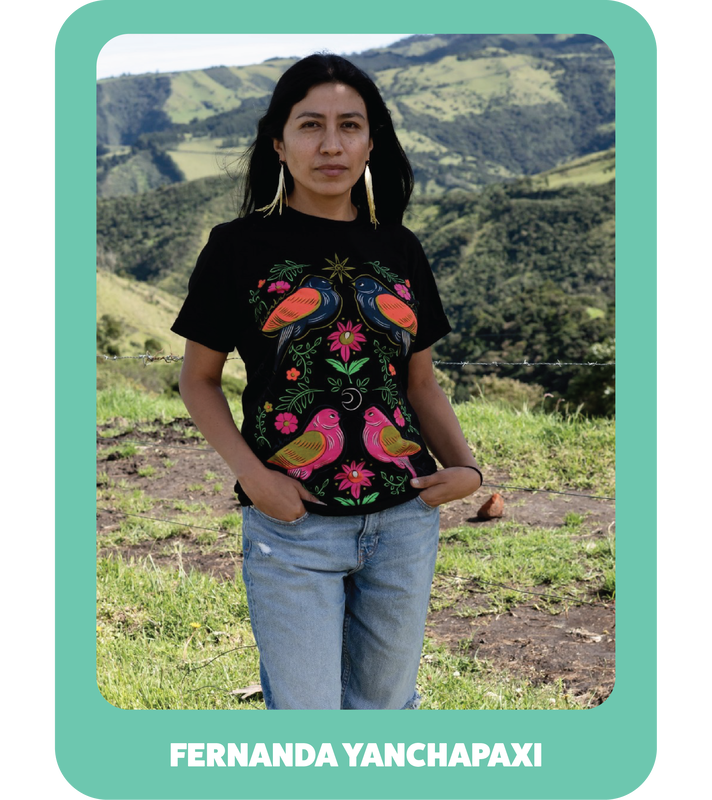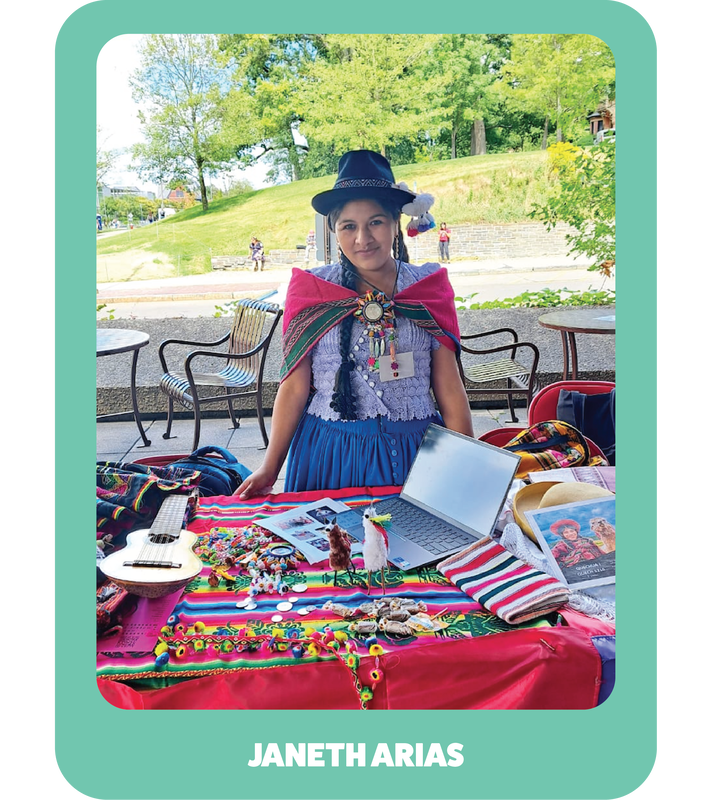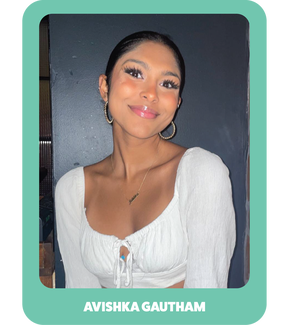Founding Members
|
Yojana Miraya Oscco is a native speaker of Quechua from the Andes of Peru. She is currently a Ph.D. student and a Vanier Scholar studying in the department of Political Science at the University of Toronto. Miraya taught Quechua language classes at the University of Toronto and also held a Teaching Assistantship at the University of Ottawa. She is an activist for Quechua language revitalization based in Toronto. Broadly, Miraya is interested in topics related to Andean politics, communal water management practices, indigenous geography, environmental justice, resource extraction and rural livelihoods. Her research focuses on Indigenous Quechua-speaking people in remote villages and the impacts of the mining industry on their communities, especially in relation to their customary forms of political organization. She earned a B.A. in Geography from the Universidad Nacional Mayor of San Marcos in Peru and completed her MA in Social Science Research through the Environment and Community program within the Department of Political Science at Humboldt State University.
Information: Website: yojanamiraya.dx.am |
|
María Eva Oscco Solórzano is a native of the department of Apurímac, Aymaraes province, district of Caraybamba. She studied Language and Literature at the Enrique Guzmán y Valle University - La Cantuta and has a M.A. in Teaching and University Management from the same university. She is currently a student of a second M.A. degree in Linguistics with Andean Studies at the Pontificia Universidad Católica del Perú. She is developing a thesis based on a comparative case study of linguistic policies in the revitalization of native languages specifically in southern Quechua. Since 2009 she has been teaching the Communication course at the Universidad Peruana Cayetano Heredia. Likewise, she is a Quechua language teacher at the Universidad Católica Sede Sapientiae. She has also been translating literary texts and documents from Spanish to Quechua and from Quechua to Spanish for 5 years. She is currently an official translator and interpreter for the Ministry of Culture in Peru.
Contact Information: Email: [email protected] |
|
Isaac Pucllas Tello is a native of the district of Chinchihuasi, province of Churcampa, department of Huancavelica. He studied Sociology in the Universidad Nacional del Centro (UNCP) and is currently enrolled in a master’s program in Community Development. He has a specialization in Development and Execution of Social Projects from the Escuela de Administración de Negocios para Graduados, ESAN; and a certification in Dialogue and Environmental Conflict Transformation for Sustainable Development from the Universidad Antonio Ruiz de Montoya. A Quechua-speaking sociologist with vast experience conducting social studies related to mining—particularly in Native and Andean Highland communities—Pucllas Tello is knowledgeable in the planning and execution of social development projects, and in the negotiation and prevention of social and environmental conflicts. He has implemented such projects in the southern region of Peru.
Contact Information: Email: [email protected] |
|
Zoila Silvia Mendoza is a Professor and Chair of the Department of Native American Studies at the University of California, Davis. Among other topics, Professor Mendoza teaches the Quechua Language and Society series which she created in 2006. She received her B.A. and Licenciatura degrees in Anthropology at the Pontificia Universidad Católica del Perú and her M.A. and Ph.D., also in Anthropology, at the University of Chicago. She is the author of books and many book chapters and journal articles mostly focusing on festivals, music and dance in Peru. She has also produced two major documentaries and has received several prestigious fellowships including a John Simon Guggenheim in 2010-2011.
Academic Page: https://nas.ucdavis.edu/people/zolia-mendoza Literature: https://ucdavis.academia.edu/ZoilaMendoza?from_navbar=true |
|
Renzo Aroni Sulca is a Quechua self-taught musician-scholar and historian of modern Latin America at Columbia University, where he teaches Indigenous Language Revitalization, Ethnicity and Revolution, and Politics of Memory in Latin America. He received his Ph.D. in History, with two Designated Emphases, Human Rights and Native American Studies, from the University of California, Davis, in 2020. He also holds B.A. and Licenciatura degrees in History from the Universidad Nacional Mayor de San Marcos and M.A. in Anthropology from the Universidad Nacional Autónoma de México (UNAM). He is working on a book about the 1992 Indigenous peasant massacre by the Shining Path in his native Ayacucho, Peru. His writings have appeared in journals, such as Latin American Perspectives, in the Peruvian media, and as book chapters in Spanish and English.
Academic Page: https://sofheyman.org/persons/renzo-aroni Literature: https://columbia.academia.edu/RenzoAroni |
|
Indira Quintasi Orosco is a Ph.D. student in the Educational Leadership and Policy (ELP) program and a fellow researcher at Ontario Institute for Studies in Education (OISE) and FutureSkills Research Lab at the University of Toronto. She received an M.Ed. degree and two collaborative specializations: Comparative International and Development Education (CIDE) and Educational Policy from OISE. She also holds a B.A. and Licenciatura degrees in Political Science and Government from the Pontificia Universidad Católica del Perú. Her work experience lies in program evaluation and technical assistance in programs and projects related to Civil Service and Educational Reforms in Teaching Profession and Inclusive Education in Peru. She has held coordination roles in program management and event planning in higher education settings at the University of Toronto. Her research interests include educational systems, education governance, teacher development, rural and inclusive education within anti-oppressive frameworks, Indigenous knowledge, and mixed methods. More recently she focuses on politics of education, migration, and education in emergencies in the Global South. She actively advocates and participates in community-led organizations that promote gender equality, Quechua language and culture revitalization, and inclusive education.
Contact Information: Email: [email protected] |
Current Members Collaborators
|
Soledad "Solischa" Secca Noa is a Quechua influencer and social anthropologist from the Universidad Nacional San Antonio de Abad del Cusco, Peru. As a native of the Andean community of Occopata, Cusco, Solischa promotes the Quechua language and culture through spontaneous visual ethnographies, documenting Indigenous cultural understandings, practices, and values, as well as their dynamics and complexities. She displays the Andean people’s way of living and knowing in rural and urban centers. Solischa claims her traditional clothes using her polleras (Andean skirts), ojotas (open-toed sandals made from recycled tires), and sombreros (Andean hats), along with her qipi (colorful blanket to carry a load on the back), as a symbol of her Indigenous identity, at the same time of being an ethnographer, activist, and Quechua.
Contact Information: [email protected] Facebook: Solischa20 Instagram: @solischa_20 Twitter: @SnSolischa TikTok: Solischa20 |
|
Yunil Yupa Quispe es originario nativo Quechua-hablante de la comunidad campesina de Pampacancha, distrito de Ocongate, Provincia Quispicanchi, Región Cusco. Actualmente es estudiante de último ciclo de la carrera de psicología en la Universidad Nacional de San Antonio Abad Del Cusco. Desde las aulas universitarias fomenta actividades relacionados en reivindicación de su lengua materna, además realizó un intercambio académico en la Pontificia Universidad Católica del Perú, después de su regreso. Actualmente se dedica a realizar diferentes trabajos, voluntariados en las comunidades campesinas en el ámbito de psicología comunitario social, específicamente con poblaciones nativos Quechua-hablantes en el área de salud mental, demostrando siempre su liderazgo en manejo de organizaciones.
Contact Information: [email protected] |
|
Andrea Román Alfaro is a Peruvian Ph.D. candidate in sociology at the University of Toronto. She is a Vanier Canada Graduate scholar, a Mary H. Beatty fellow, and a Connaught Public Impact Fellow. She holds an M.A. in Sociology from the Pontificia Universidad Católica del Perú and a B.A. in sociology and government from Skidmore College. Currently, Andrea is working on her ethnographic dissertation which examines the dynamics and politics of violence in Callao, Peru,
from women's and young people’s perspectives. Andrea writes in Spanish and English. Her work has been published in Social Justice and Curriculum Inquiry. She has taught and done research in Peru and Canada. Her current areas of interest include the sociology of violence, punishment, criminalization, gender, and healing. Contact Information: Email: [email protected] Website: andrearomanalfaro.com Twitter: @A_Romanoalfaro |
|
Thalia Taylor is a J.D. Candidate at the University of California, Davis, with a focus on Indigenous rights in environmental law and cultural heritage protection. She holds a BA in International Relations, Spanish Literature, and Arabic from Indiana University Bloomington. Before law school, she worked as a grant writer and project developer for a nonprofit, partnering with Indigenous Nations throughout North America to obtain funding for language preservation projects. Originally from Chicago, IL, she lived in Bolivia as a teenager, where she first developed an interest in international politics and Indigenous rights. In her spare time, she enjoys rock climbing, baseball, and learning languages.
Contact Information: LinkedIn: Thalia Taylor |
|
Fernanda Yanchapaxi was born and raised in the Andes in Ecuador and is Ph.D. Candidate at OISE, the University of Toronto. Her research work examines applications of intellectual property, practices of Indigenous data governance, and frameworks of knowledge protection in Indigenous research. Her work highlights how Indigenous data sovereignty movements, Indigenous research practitioners, and Indigenous communities work alongside one another to protect Indigenous knowledge and to assert Indigenous Data Sovereignty. She is a Research Fellow and Lab Manager of the Technocience Research Lab and a Senior Research Assistant at the Tkaronto CIRCLE Lab, both Indigenous research labs at the University of Toronto. She is Kichwa (Panzaleo) and Mestiza and is accountable to her land (Sigchos) where her family still lives.
|
|
Janeth Arias, nacio en la ciudad de Tarija el 12 de septiembre de 1988. Hija de Bruno Arias, oriundo de la comunidad de Ocurí provincia Nor Cinti-Chuquisaca y Pilar Lupa, originaria de la comunidad de Tambillo, Provincia Colcha K-Potosí. Estudio en la Universidad Juan Misael Saracho. Trabajo en una institución de la ciudad de Bermejo como maestra de inglés de niños y adolescentes. Un año más tarde, volvio a la ciudad de Tarija donde trabajo en diferentes instituciones públicas y privadas enseñando inglés, francés, quechua y castellano. El año 2016 fue parte de la organización AIESEC, una organización de jóvenes líderes quienes promueven el pleno desarrollo del potencial humano a través de intercambios internacionales con diferentes proyectos referentes a los objetivos de desarrollo sostenible de la Naciones Unidas (ODS), el mismo año obtuvo la oportunidad de trabajar con el proyecto “Educación de Calidad” y “Reducción de Desigualdades” en la ciudad de Quito, Ecuador.
Obtuvo la beca FLTA del programa Fulbright, que por su siglas en inglés hace referencia a ser asistente de cátedra de un idioma extranjero en una universidad de los Estados Unidos. El año 2022 logré obtener esta beca para enseñar quechua en la universidad de Cornell, en Ithaca - Nueva York. |
CURRENT INTERNSHIPS COLLABORATORS
|
Avishka Gautham is a current third year undergraduate student pursuing a BA in a political science specialist with a minor in sociology. She is passionate about advocating for those without a voice in society, namely refugees and asylum seekers. Further, she is extremely passionate about Indigenous issues within a Canadian and global context, and wishes to pursue a career in the intersection between Indigenous studies, human rights and the law.
|
Advisory Board
|
ACTIVE COLLABORATORS
Carlos Tello Barreda [email protected] Instagram: @segundoviaje Twitter: @segundoviaje Yunil Yupa Quispe [email protected] PAST COLLABORATORS Juan Carlos Gonzales Tacza Mery Antonia Bravo Contreras Janeth Huanca Ricra Cheyenne Haylor Angel Manuel Cuipa Chancahuaña |
